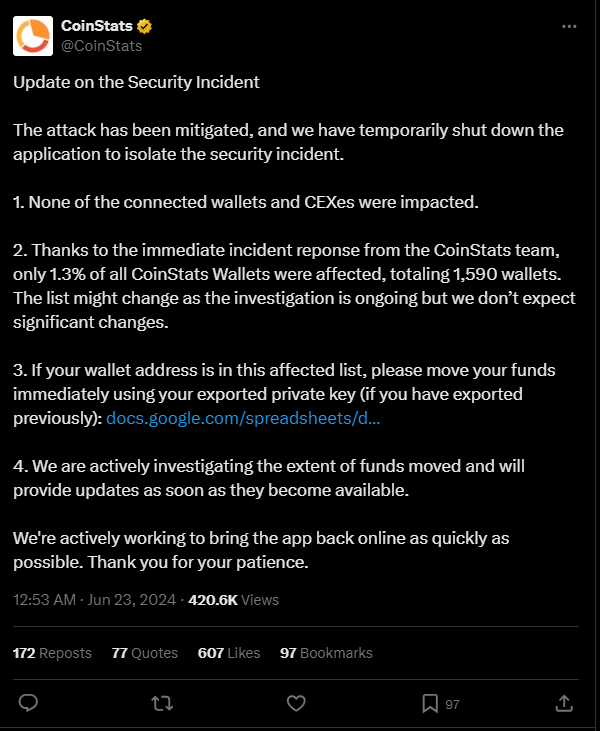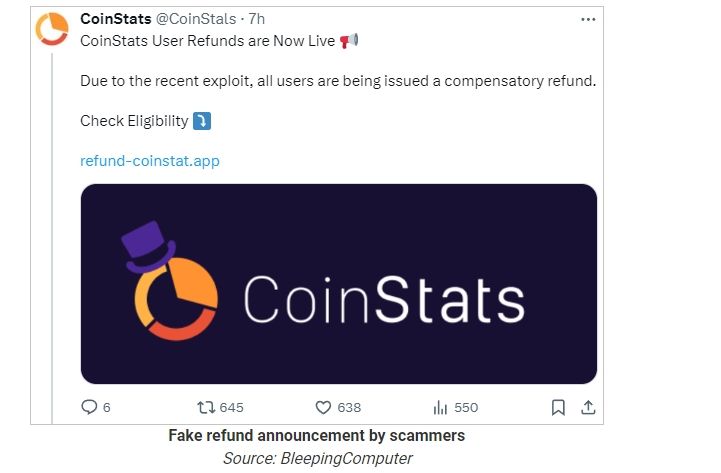Coinstats Breach: State-Sponsored Hackers to Blame for Stealing Funds From Approx. 1,600 User Accounts

Cryptocurrency portfolio management app CoinStats has disclosed a cyberattack believed to have been carried out by state-sponsored threat actors from North Korea who breached 1,590 user cryptocurrency wallets on the platform.
According to an announcement on X, this cyberattack, attributed to the notorious Lazarus Group, compromised approximately 1.3% of the wallets hosted by CoinStats.

The company also shared a list of impacted wallets, just short of 1,600. However, Bleeping Computer notes that the number of hacked accounts could be greater due to additional reports from users whose wallets were not mentioned in the initial list.
Coinstats recommended the immediate transfer of funds to an external wallet for affected users. The website and app have been temporarily offline for investigation and security enhancements.
As of June 24, the website and app are back online but with limited functionality “to ensure a smooth and stable experience.” Coinstats promises an update covering all the details of the incident as soon as possible.

What should Coinstats users do?
- Follow CoinStats' recommendations regarding the secure transfer of funds “using your exported private key.”
- Despite the lack of additional details on the hack, we recommend resetting your Coinstat password as a precaution and enabling 2FA.
- Use official Coinstats channels for updates and news regarding the incident
- Be wary of fraudulent refund schemes currently circulating online, as the company has not launched any official refund programs
“Scammers are already attempting to take advantage of the CoinStats breach by promoting fake refund programs in responses under the official announcement on X, using unverified accounts with typosquatting handles, such as '@CoinStals',” BleepingComputer warned.

- Use a digital identity protection service to stay up to date with data breaches impacting your digital footprint and benefit from real-time alerts, and straightforward action items to immediately close potential risks
- Use Bitdefender Scamio, our free AI-powered scam detector to stay ahead of scammers no matter the situation.
When unsure about an email, message or link, check it with Scamio on WhatsApp, Facebook Messenger, or a web browser for free! Copy/ paste a text or link, describe the situation, and upload the image or the QR code you want to verify. Scamio will analyze the data and tell you if anyone is trying to scam you. You can also help other crypto aficionados stay safe by sharing Scamio with them in France, Germany, Spain, Italy, Romania, Australia and the UK.
tags
Author
Alina is a history buff passionate about cybersecurity and anything sci-fi, advocating Bitdefender technologies and solutions. She spends most of her time between her two feline friends and traveling.
View all postsRight now Top posts
Uncovering IoT Vulnerabilities: Highlights from the Bitdefender - Netgear 2024 Threat Report
June 26, 2024
UEFA EURO 2024 Scams Are Already Here – How to Stay Safe
June 25, 2024
Most People Still Write Important Passwords Down, Bitdefender Report Finds
June 07, 2024
1 in 4 Consumers Faced a Security Incident in the Last Year, Bitdefender Report Shows
June 03, 2024
FOLLOW US ON SOCIAL MEDIA
You might also like
Bookmarks








